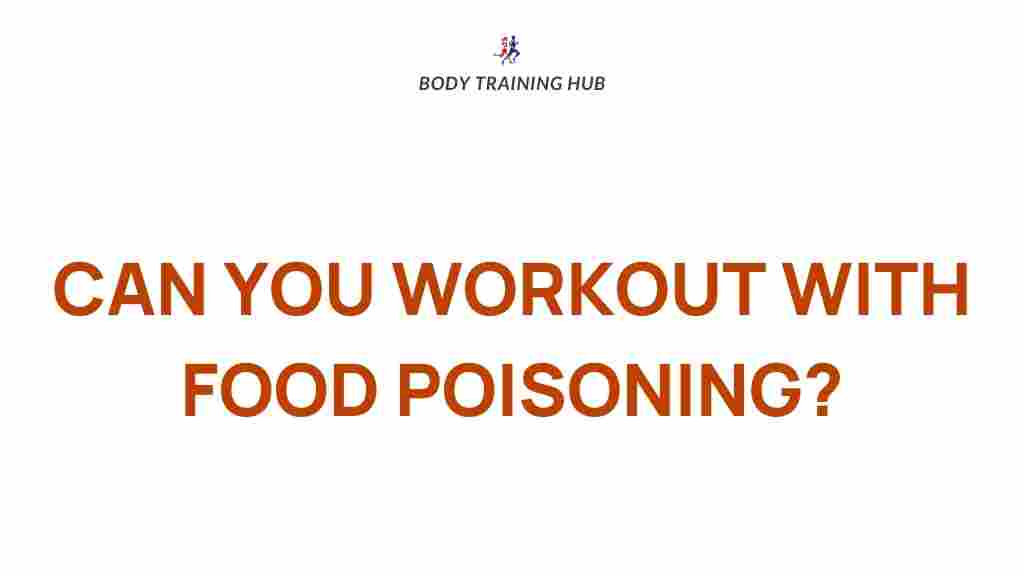Uncover the Truth: Exercising with Food Poisoning
Food poisoning can strike anyone at any time, leading to a range of unpleasant symptoms that can leave you feeling weak and unwell. This raises a crucial question: should you maintain your workout routine when you’re experiencing food poisoning? In this article, we will explore the relationship between exercise and food poisoning, debunk some common myths, and provide guidance on how to approach recovery while prioritizing your health and fitness.
Understanding Food Poisoning
Food poisoning is often caused by consuming contaminated food or drinks, leading to symptoms such as:
- Nausea
- Vomiting
- Diarrhea
- Abdominal pain
- Fever
These symptoms can vary in intensity and duration, depending on the cause and the individual’s health. Generally, people recover from food poisoning within a few days, but some cases can be severe and require medical attention.
Myths About Exercising with Food Poisoning
There are several myths surrounding the idea of working out while experiencing food poisoning. Let’s debunk a few of them:
- Myth 1: “A light workout can help you recover faster.” – In reality, exercising while your body is fighting off illness can lead to increased fatigue and prolonged recovery time.
- Myth 2: “You can just push through the pain.” – Listening to your body is essential. Ignoring symptoms can worsen your condition.
- Myth 3: “All exercise is beneficial, no matter how you feel.” – This is not true when it comes to food poisoning. Your body needs rest to heal.
When to Avoid Exercise
Knowing when to take a break from your fitness routine is crucial for your health. Here are some guidelines on when to avoid exercise:
- If you are experiencing severe symptoms such as persistent vomiting or diarrhea.
- If you have a fever over 100.4°F (38°C).
- If you feel lightheaded or dizzy when standing up.
- If you are unable to keep food or fluids down.
The Importance of Rest and Hydration
During food poisoning, your body needs ample rest and hydration. Here are some tips to prioritize your recovery:
- Stay Hydrated: Drink plenty of fluids to replace lost fluids and electrolytes. Water, clear broth, and electrolyte solutions are excellent choices.
- Rest: Allow your body to heal by getting plenty of rest. Sleep is vital for your immune system to function effectively.
Recovery and Gradual Return to Exercise
Once you start feeling better, it’s essential to approach your return to exercise gradually. Here’s a step-by-step process to follow:
Step 1: Assess Your Condition
Before resuming any workout, ensure your symptoms have subsided. You should feel hungry, hydrated, and free of nausea, vomiting, or diarrhea.
Step 2: Start Slowly
Begin with light activities such as:
- Walking
- Gentle stretching
- Yoga
These low-impact activities can help gauge how your body responds to movement.
Step 3: Listen to Your Body
Pay close attention to how you feel during and after your initial workouts. If you experience any discomfort or a return of symptoms, it’s best to stop and rest.
Step 4: Gradually Increase Intensity
Once you feel comfortable with light activities, gradually increase the intensity of your workouts. Incorporate:
- Moderate cardio exercises like cycling or jogging.
- Strength training with lighter weights.
- Increased flexibility sessions.
Nutrition Post-Recovery
After recovering from food poisoning, your body needs proper nutrition to regain strength and energy. Here are some important tips:
- Start with Bland Foods: Foods such as bananas, rice, applesauce, and toast (the BRAT diet) are great for easing back into eating.
- Stay Hydrated: Continue to drink fluids to help your body recover.
- Avoid Heavy Foods: Steer clear of fried, greasy, or spicy foods until you feel fully recovered.
Common Signs of Overexertion
As you return to your fitness routine, be mindful of these signs that may indicate you are pushing yourself too hard:
- Increased fatigue
- Shortness of breath
- Rapid heartbeat
- Dizziness or lightheadedness
If you notice any of these symptoms, it’s crucial to rest and consult a healthcare professional if they persist.
When to Seek Medical Advice
It’s essential to know when to consult a doctor, especially after experiencing food poisoning. Seek medical attention if:
- Symptoms persist for more than a few days.
- You experience severe dehydration.
- You notice blood in your stool or vomit.
- You have a high fever that doesn’t respond to medication.
Conclusion
Exercising with food poisoning is not recommended. Your body needs time to recover, and pushing through workouts can hinder your healing process. Prioritize rest, hydration, and a gradual return to exercise once you feel better. Remember, your health should always come first in your fitness journey. If you have any doubts, it’s best to consult a healthcare provider for personalized advice.
For more information on maintaining health during illness, check out this resource. And for tips on effective workouts, visit our fitness guide.
This article is in the category Myths & Facts and created by BodyTraining Team
